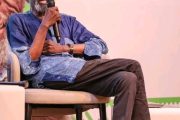Hints about President Muhammadu Buhari have become more and more scarce after the planned return of the President last Friday did not materialise. The President would have quietly returned to Abuja on July 7th, 2017 to the chagrin of the Ayo Fayoshes of Nigeria if everything had worked fine. Intervention is unable to obtain much hints as to why the President didn’t return, especially as to whether it has to do with technical reasons or more treatment.
Governor Ayo Fayoshe of Ekiti State had claimed a few weeks ago that the President has been on life support.The governor would have been thoroughly embarrassed if the otherwise happened last Friday. That has not happened and it has not been possible to get credible hints from even the best of sources in this regard.

Acting President Osinbajo,: cerebral but presiding over power related commotion
Meanwhile, the homefront gets messier in the President’s absence. Deep seated cabalistic struggle for ascendancy is not only unfolding within the government and between arms of it but also within the party, much of it underpinned by 2019 considerations. Added to that is the state of the economy, the Biafran challenge and the agitation for restructuring.
In the case of struggle between arms of government, the anti-corruption war has become the theatre of contestation and test of strength, with the confirmation of Ibrahim Magu as Chairman of the EFCC as the point of departure. While many think the problem is simply that Magu knows a lot as to make the declared decision of the Executive arm to appeal Bukola Saraki’s acquittal by the Code of Conduct Tribunal potentially explosive, there are others who fear that Saraki has an atomic bomb of a joker. Intervention has been reminded of how Dr Saraki it was who raised the question of misspent oil subsidy which subsequently foregrounded the January 2012 anti-government protest. The Senate under him, it is also mentioned, has also raised the question of unaccounted oil sales from 2006 to date. The fear then is that there might be a mine field somewhere about which he knows.

Gov Aminu Tambuwal of Sokoto State

Dr Bukola Saraki, Senate President
The resulting Mutual Assured Destruction, (MAD) is feared to be capable of unscrambling the system. If these arguments pack punch, then Nigeria might be heading for balance of terror at the echelon of power. This is more so that Saraki, like Governor Aminu Tambuwal of Sokoto State, is a beneficiary of rebellion, Tambuwal against the PDP in 2011 and Saraki against the APC in 2015. Unlike Tambuwal who successfully reconnected with the party through an elaborate reconciliation process after assuming office, Saraki appear not to have been able to do that within the APC, making this face-off a do or die affair.
One question being asked is whether there is a towering and neutral figure that can effect reconciliation within the party at this point. Right now, there appears no such figure, making 2019 election to be a typical quinquennial warfare elections turn out to be in much of Africa. Of course, 2019 is still a long way off in politics and a charismatic figure with capacity to reconcile contending interests could miraculously emerge.




























